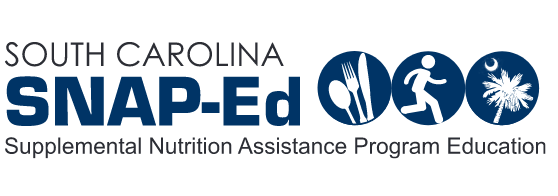Evaluation Projects
We conduct formative, process, and outcome evaluations for SNAP-Ed across South Carolina. We ask questions to inform program expansion, capacity building, and sustainability, as well as to identify promising practices and learn from challenges encountered. Our methods include both qualitative and quantitative approaches. Much of our evaluation follows or is inspired by the national SNAP-Ed Evaluation Framework. Each year we work with the state’s SNAP-Ed agencies to collect data for priority indicators to show program outcomes state-wide. These include:
- MT1 – Healthy Eating Behavioral Changes
- MT2 – Resource Management Behavioral Changes
- MT3 – Physical Activity and Reduced Sedentary Behavioral Changes
- ST7 – Organizational Partnerships
- MT5 – Nutrition Supports
- MT6 – Physical Activity and Reduced Sedentary Behavior Supports
- ST8 – Multi-Sector Partnerships and Planning
We are also members of the Association of SNAP-Ed Nutrition Education Administrators (ASNNA) and their Evaluation Committee where we learn from and contribute to national SNAP-Ed evaluation projects.
Evaluation Questions
- To understand SNAP-Ed implementer capacity to guide sites and partners on PSE and promotion strategies for healthy eating and active living in conjunction with delivering direct nutrition education (conducted in 2015, 16, 17, 18, 19, 20, and 21). Draper CL, Younginer N. The readiness of SNAP-Ed implementers to guide partners in changing policy, systems, and environments for healthy eating and active living. Journal of Nutrition Education and Behavior. 2021; 751-758. DOI: https://doi.org/10.1016/j.jneb.2017.05.034.
- To understand barriers and opportunities for SNAP-Ed implementers to work with sites and partners on implementing PSE strategies for healthy eating and active living (conducted in 2015 and 16). Draper CL. Exploring the feasibility of partnerships between public libraries and the SNAP-Ed program. Public Library Quarterly. 2021. DOI: https://doi.org/10.1080/01616846.2021.1906615.
- To explore SNAP-Ed eligible participants’ perceptions of 1) barriers to accessing fruits and vegetables, and 2) preferred healthy eating strategies (conducted in 2016). Increasing Access to Produce in South Carolina Through the SNAP-Ed Program: Focus Group Findings. Research Brief, June 2017.
- To investigate the process of nutrition support adoption across a sample of sites to understand: “What factors lead to or hinder nutrition supports from being adopted at SNAP-Ed partner sites?” (conducted in 2017).
- To explore the sustainability of policy, systems, and environmental nutrition supports implemented in partnership with the South Carolina SNAP-Ed program in 2017 (conducted in 2018). https://www.jneb.org/article/S1499-4046(19)30697-9/fulltext
- To identify successes, challenges, and recommendations for strengthening the SNAP Healthy Bucks Program (conducted in 2018).
- To assess familiarity and experience among SNAP recipients with the SNAP-Ed and the SNAP Healthy Bucks Programs, and to understand SNAP recipients’ environments and experiences to inform tailored SNAP-Ed programming (conducted in 2018). https://www.jneb.org/article/S1499-4046(20)30345-6/fulltext
- To develop and validate decision cases as a training tool to build SNAP-Ed implementer capacity to guide sites and partners on changing policies, systems, and environments (conducted in 2018). Pope H, Draper CL, Younginer N, Whitt O, Paget C. Use of decision cases for building SNAP-Ed implementers’ capacities to realize policy, systems, and environmental strategies. Journal of Nutrition Education and Behavior, 2020; 512-521. DOI: https://doi.org/10.1016/j.jneb.2019.09.020.
- To identify sectors with which SC SNAP-Ed program implementers currently engage or plan to engage with in the future (conducted in 2018, 2019, and 2021). https://www.jneb.org/article/S1499-4046(19)30798-5/fulltext
- To identify strategies for the SNAP-Ed program in expanding programming focused on physical activity and reduced sedentary behaviors (conducted in 2019).
- To identify the readiness of health clinics to partner with the SNAP-Ed program on nutrition support adoption (conducted in 2019). Draper CL, Dreyer E. Readiness of health clinics to implement evidenced-based healthy eating strategies in partnership with the SNAP-Ed program. Journal of Nutrition Education and Behavior. 2021; 843-850. DOI: https://doi.org/10.1016/j.jneb.2021.03.008.
- To identify strategies for the SNAP-Ed program in expanding and strengthening transportation systems within low-income areas to get to and from programming sites (conducted in 2019). https://www.jneb.org/article/S1499-4046(20)30238-4/fulltext
- To identify strategies for the SNAP-Ed program in better reaching front-line food workers through direct nutrition education and PSE interventions (conducted in 2019).
- To understand if participation in the FoodShare intervention, an emerging evidence-based intervention included in the SNAP-Ed Toolkit, improves healthy eating and resource management behaviors (conducted in 2020, 2021, and 2022).
- To understand the impacts and adaptations of University of South Carolina SNAP-Ed implementation partners to adopt, maintain, and sustain nutrition supports during the COVID-19 public health emergency (conducted in 2020).
- To understand the impacts and adaptations of Implementing Agencies to implement all aspects of SNAP-Ed programming during the COVID-19 pandemic (conducted in 2020 and 2021).
- To identify the perspectives of SNAP-Ed implementers on direct nutrition education program delivery and implementation fidelity (conducted in 2020).
- To 1) assess the readiness of groups to start or expand a food policy council and 2) track changes in SNAP-Ed multi-sector and priority population engagement in the FPC over time (conducted in 2021).
- To understand the structure and form of the Columbia Food Policy Committee’s COVID-19 response in order to position the Committee to meet the needs created by future crises by helping to build a more resilient food system (conducted in 2021).
- To identify opportunities for expanding different levels of SNAP-Ed programming in priority counties (in progress).
- To determine the feasibility and develop methods for capturing data on race/ethnicity and other sociodemographic characteristics within different levels of SNAP-Ed programming (in progress).

For more information, contact:
Carrie Draper, Principal Investigator, at draper@mailbox.sc.edu.
